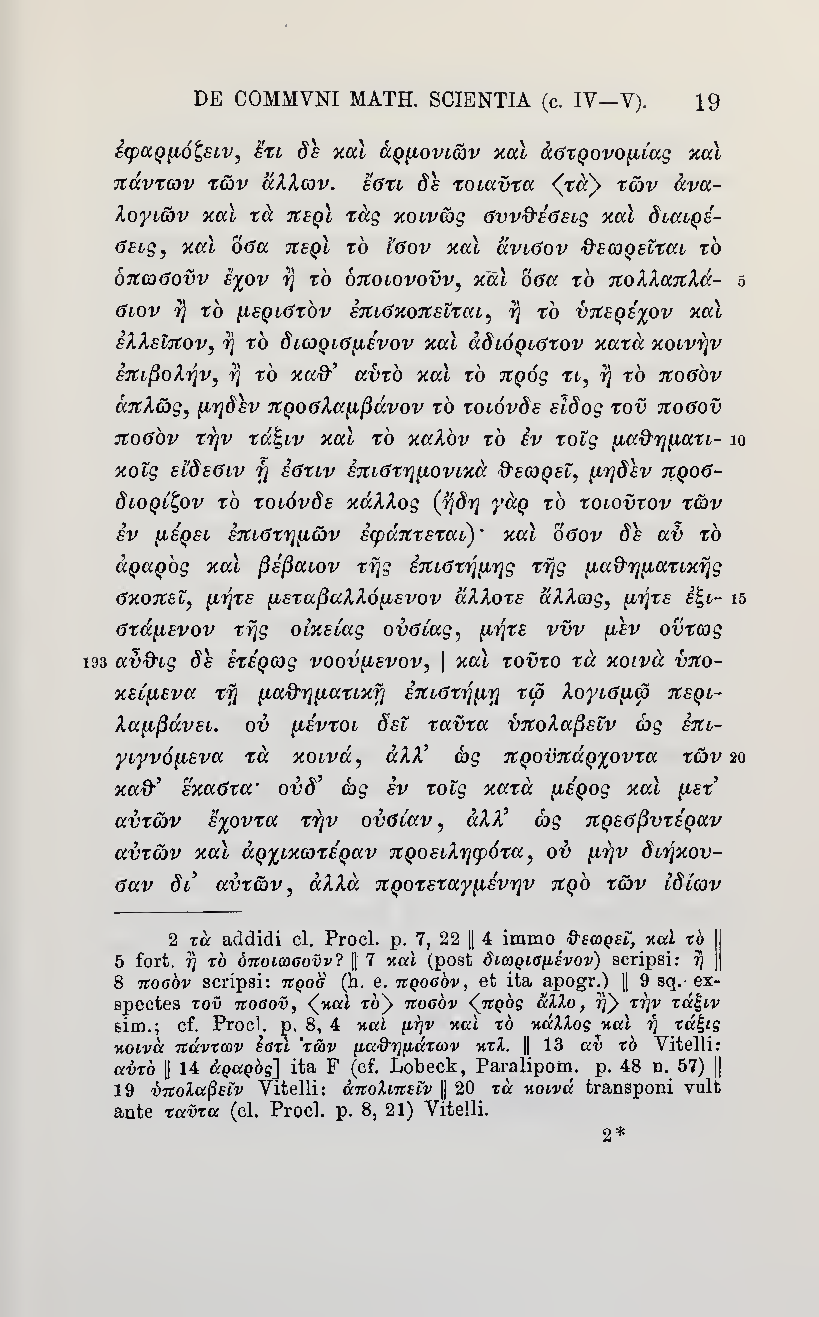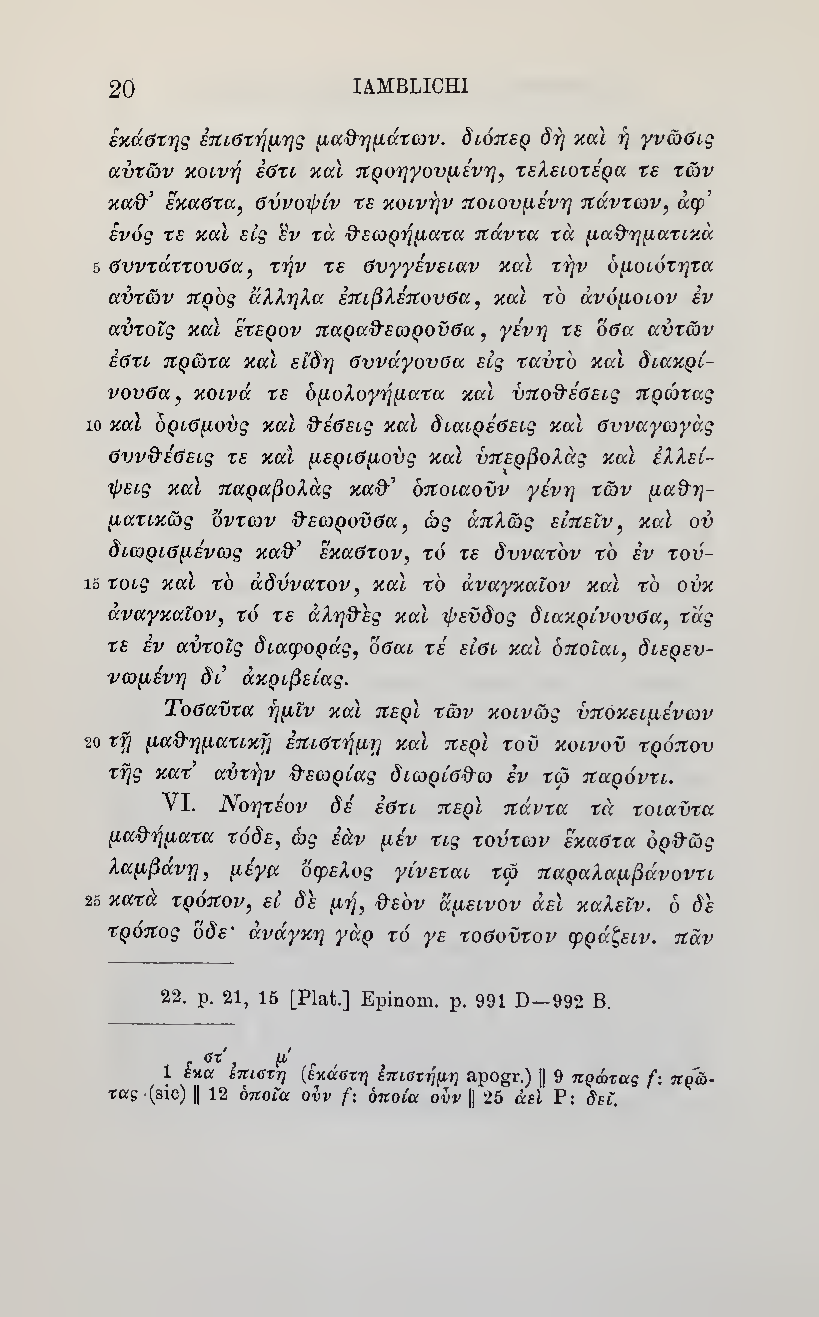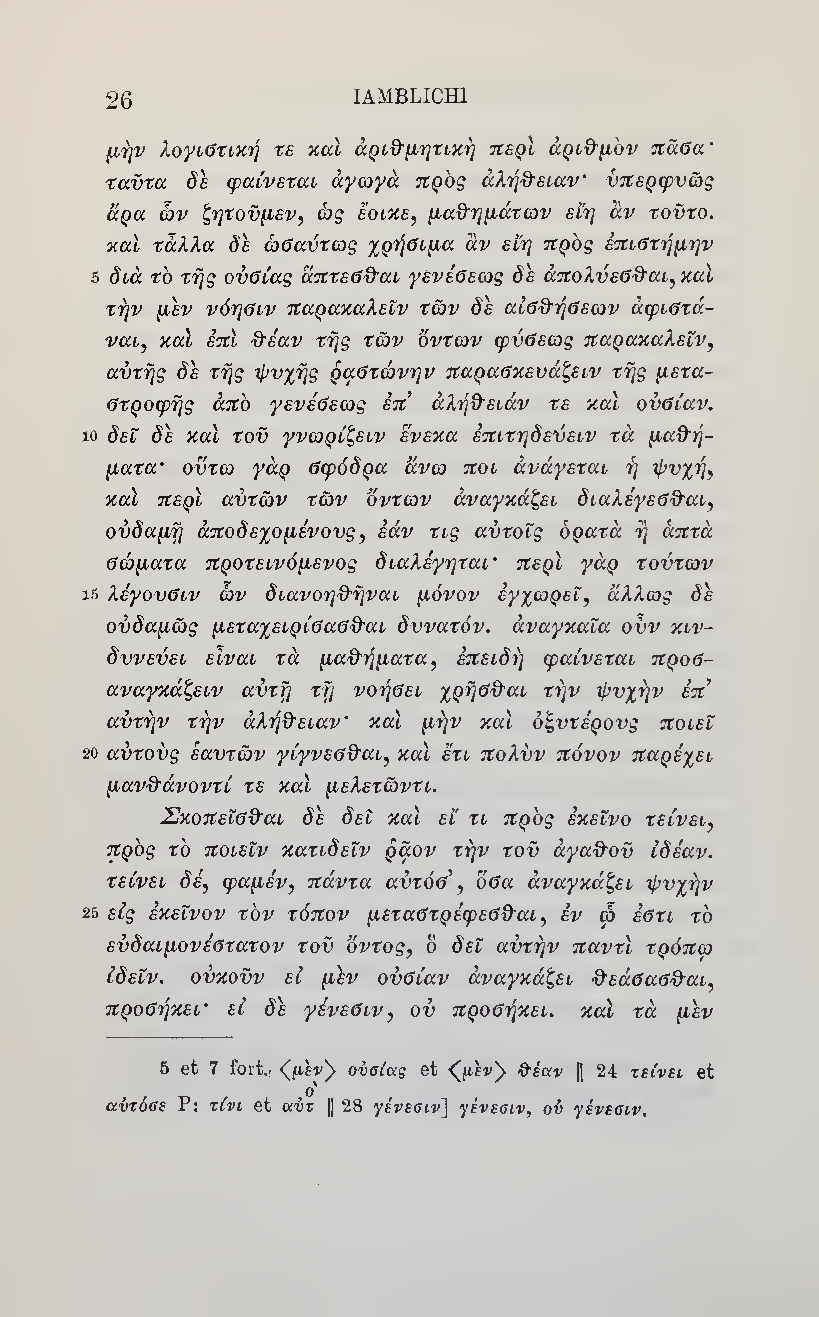Iamblichus, "On the General Science of Mathematics"
Iamblichus: On the General Science of Mathematics, translated by John Dillon and J. O. Urmson, Ancient Commentators on Aristotle, Bloomsbury Academic, 2020
p. 44, Chapter 5:
Further, as for what looks to the firmness and constancy of mathematical science, which does not change from time to time, nor depart from its own essential nature, nor is conceived first in one way and then in another, this too is embraced by the common subject-matter of mathematical science within its reasoning. But one should not think of these common features as supervening on, but as being prior to, the particular studies; nor should they be thought of as included in the particular and having their being with them, but as having already a being which is prior to them and more fundamental, and not as dwelling in them but as set in place before the special objects of each mathematical science. For this reason knowledge of them is common to all and fundamental, more basic than that of the particular ones, and giving a general overview of all, arranging together all theorems of mathematics from a single beginning to a single end, surveying their kinship and likeness to each other, while taking account also of what is dissimilar and different in them, collecting together their primary kinds and their species, and distinguishing them. Also it surveys their common agreements, their prime hypotheses, their definitions, their postulates, their divisions and compositions, their aggregations and separations, their excesses and deficiencies and comparisons, throughout all the kinds of mathematical entities. It gives a unified account and not one separately of each, distinguishing what is possible in them and what impossible, what necessary and what not, the true and the false, and also their differences, their number and character, conducting a most accurate investigation.
p. 48, Chapter 6:
One should study mathematics also for the sake of knowledge; for the soul is in this way strongly led upwards, and it compels us to discourse about realities themselves, in no way tolerating it if someone, in discussion of them, brings to the fore visible or tangible bodies. For it speaks about those things about which reasoning alone is possible, it being not possible to deal with them in any other way. So mathematics is, it would seem, indispensable, since it can be seen to compel the soul to make use of intellect itself on the road to truth. Also, indeed, it makes people excel themselves in acuity, and further it provides much labour for him who studies and practises it.
pp. 81-82, Chapter 24:
Next, we should discuss the group practice (sunêtheia) in the Pythagoreans’ occupation with mathematical pursuits. So then, they separated mathematical arguments from the realm of the sensible, and converted the reasoning faculty to an assurance of incorporeal being through mathematics. They used it as a means of transport to the intelligible, and especially investigated what mathematics contains akin to the pure forms and unitary reason principles. Therefore they made use of this procedure in their inquiries, once and for all separating the knowledge of mathematics from the common and widespread level of understanding, and accordingly transmitted it as a secret. They shared the knowledge of it with very few, and if some leak to the multitude occurred, they abominated it as an impiety. Consequently they repelled also those outside the group practice as being unworthy to share in mathematics. For Pythagoras considered that they should not share their mathematical knowledge with all, but only with those with whom one would share the whole of one’s life. He did not accept people into this fellowship at random nor casually, but he tested them over a long period, rejecting the unworthy.
Also, he did not communicate outside the group practice the advances made by himself, but kept the discussions of mathematics secret from others; but he brought about great advances among those called Pythagoreans by their association with him, both in the understanding of mathematics and in the study of geometry; also one would find that the basis of nearly all later advances came to us from him. He esteemed in mathematics not, as do some later persons, the power by which they will be able to solve a problem, but the insights themselves; and, of these, not those most difficult to discover, like most of those later, but those of them in which one could recognize order or some natural property.
This was their attitude because they thought that the principles of the whole of nature were present in these, and that these were especially easy to grasp – what they were and how many – because they were concerned with a nature that was invariant and free from change, and was also simple. Therefore they did not deal with issues that involved raising problems except those concerning basic elements, such as geometrical application (parabolé) and the squaring
. Nor did they make it their business in their investigations to exhaust every issue and leave no possibility unexplored, but sought only to see the principles themselves in each case. They made a training in these sciences and a rational working out that was exact and theoretical into a proper science. They assigned a suitable ordering within the sciences, and they accepted few things as principles and developed them. Also they especially perfected the most valuable and most profound of the theorems; they applied theorems differently studied to other matters, and set them in such an order as to propound the more simple , those requiring composition next. Also they arranged them in accordance with the nature of things, suitably to our power and to the worth of those who received them, in a way leading to excellence, in accord with the whole of education and as proper for the purification of the soul. Such, then, is the information one might give about this Pythagorean method of procedure, about which we shall say more in the accounts that will be given of each of the branches of mathematics individually.
Iamblichi De communi mathematica scientia liber, edited by Nicola Festa and Ulrich Klein, Bibliotheca scriptorum Graecorum et Romanorum Teubneriana, B. G. Teubner, Stuttgart, 19751
pp. 19-20, Chapter 5
p. 26, Chapter 6


